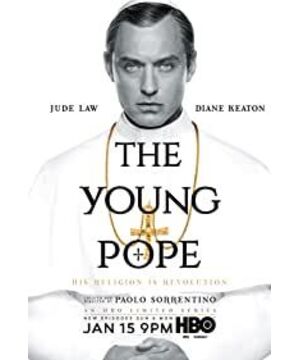"The Young Pope" is a drama with a very "Shen Xia" style. The whole drama focuses only on the Pope's self-discovery and spiritual and emotional growth, and all plots about the external world (such as power struggles) are not Important, and often piecemeal, jumpy, unrealistic (a "don't care about the details" style anyway). After watching the whole drama, the theme I felt was: what kind of heart can be called "divine", and what kind of love is "divine love". In my imagination, to reach divinity and become a saint, you need to overcome all your weaknesses, pains, fears, and desires, give up all obsessions, no longer have any emotional defects and spiritual swings, and enter some kind of A state of peace and perfection that will not be shaken by anything. However, the show seems to give a completely different answer. We have been looking forward to seeing the growth of the young Pope, and he did gradually become more mature and tolerant, but until the end, the Pope still did not unravel his biggest knot, (perhaps in his imagination) he saw his parents Once he turned to leave, he was in such pain that he collapsed to the ground. He was still naive and self-willed, and liked to use intimidation to create fear in others, scaring the children visiting the museum to tears. He is still fragile and easy to lose, (perhaps in imagination) going to the beach to put a photo of himself and baby Pius on the beach, forcibly brushing Esther's presence, it can be seen that he still can't let go "I love you so, but you betray me leave me" thoughts. He still couldn't get rid of the pain and obsession of the past, but because of Voiello's words, he came up with an extremely childish plan to go to Venice to preach publicly to find his parents. Over the course of the season, almost none of the Pope's spiritual weaknesses have disappeared, and if he has grown, it's only manifested in the fact that he increasingly replaces anger with love, but perhaps this is actually divinity. From a heart-breaking point of view, the Pope's love for the world probably comes mainly from his own spiritual shortcomings. In the Pope's love letter, he was candid about his motives - "the loss of love". As an orphan, the Pope had no choice but to lose the love of his parents. On the beach in California, the girl said "you can touch my leg", but he didn't do that, he said it was "loss of love". The Pope's love letter said that there are only two answers to love, to find love or to lose love. In terms of loving and being loved, the Pope chose to give up and lose. However (perhaps in his imagination), the California girl of those days has become a mother and found the happiness of love. When asked "what kind of person do you most want to be", the Pope said he would most like to be a child But in behavior, the Pope can be extremely selfless, and when the Pope saw Esther and her husband making humans by the window, he prayed desperately for the couple under the window until he burst into tears. Perhaps because of the pain and weakness, the Pope did not have the courage to "find love", and he chose to "lose it." However, the selflessness of the Pope lies in the fact that he hopes that the world can find love, and that he did not seek love because he did not have it. Jealousy and resentment, in his sincere effort and dedication to help the world find love, I think this is what he said in his love letter "I don't have the answer. But this is the answer I'd like to imagine. Because in the end, we don't There is no choice, we have to look for it." I remember there was a well-known literature on economics that looked at whether people really had "altruistic" motives. Specifically, that paper looked at the behavior of parents to leave bequests to their children. On the surface, leaving a legacy to your children can only be motivated by altruism, otherwise why not use the money for your own consumption and enjoyment? However, from an economic point of view, if the motive for leaving an inheritance is really altruism, then the amount of inheritance left by parents to their children should be linked to their children’s economic status (because the poorer the children, the more money each dollar of inheritance brings to him). the higher the marginal utility of the child. Since "altruism" means "doing it for the utility of others," the poorer the child, the more altruistic parents should bequeath to their children). As a result, the study found that the amount of inheritance left by parents to their children was only related to the characteristics of the parents themselves (such as the amount of assets of the parents), and not to the financial status of the children. So, the study concluded, parents don't leave bequests for their children out of altruistic motives, people leave bequests only because it makes them feel good about themselves. When I read this study, I was shocked. I think it turns out that there is really no selfless love and dedication between people. Even between parents and children, even behind the seemingly selfless behavior of leaving an inheritance, it is just selfishness. How ironic that our love and devotion are not at all for others, but only because it makes us feel good about ourselves. But now that I think about it again, is the so-called motivation really that important? Judging from the actual results, children receive money from their parents and believe that their parents love them. Isn't this perfect? Why should they care about their parents' motives? Isn't it perfect for the young Pope to try to spread the love of God to the world, to bring the seriously ill back to life, to make an infertile woman a mother, and to touch the whole world with a love letter that was never sent? why care about him What is the motive? The fact, I think, that humans need to feel good about themselves through love and devotion speaks volumes about our nobility in itself. The young Pope was able to grow out of his weakness and pain the desire to love the world, and of course he was already a saint with a divine nature. Maybe we don't have to cling to and wash away our pain and weakness, because pain and weakness are not totally negative things. At the end of the ninth episode, Kurtwell's son finally decides to help Gutierrez testify against his father, explaining his decision to Gutierrez this way: "Do you remember the moment we both watched the skater girl together? That was a big deal. Moment, because only the two of us in the world saw that scene. At that moment I felt that I was close to you, because I felt that you also harbored the same despair as me. At that moment, I told myself that I trusted This person." You see, pain and weakness can also be the driving force for people to connect, and it is precisely because we share pain and weakness that we need each other, and we need to love and be loved. If everyone really achieves the perfect peace of no desire and no desire, although there may be no more fighting and hurt in the world, I am afraid that there will be no love and communication. The Pope likes the story of Santa Juana very much. What is the meaning of this story, maybe everyone has a different answer. In my opinion, this story tells us that although people may not be able to save themselves, they can still love and save others. Santa Juana miraculously cured many sick children, but she herself died of a terminal illness at the child's age. The young Pope touched people all over the world with his love, but he himself fainted with heartache when he saw his parents turn and leave again during the sermon. But even so, Santa Juana is still worthy of a saint, and so is the young pope, because they tell everyone that God is love and smiles. Although people may not be able to save themselves, they can still love and save others. This is divinity. So in the end, although the Pope fainted in pain, he also saw the image of God in the sky. I think this might be his second calling. Lastly, there's one detail I love about Santa Juana's story: She brings oranges every time she goes to see sick children, because she says that the smell when you peel an orange is the smell of God and good deeds. The taste of peeling the orange peel is really beautiful, clear and pure, bitter and sweet, not artificial. It is said that Guerlain's citrus green tea perfume is that kind of taste, and I must buy a bottle. The Pope can generate the desire to love the world from his own weakness and pain, and of course he is already a saint with divinity. Maybe we don't have to cling to and wash away our pain and weakness, because pain and weakness are not totally negative things. At the end of the ninth episode, Kurtwell's son finally decides to help Gutierrez testify against his father, explaining his decision to Gutierrez this way: "Do you remember the moment we both watched the skater girl together? That was a big deal. Moment, because only the two of us in the world saw that scene. At that moment I felt that I was close to you, because I felt that you also harbored the same despair as me. At that moment, I told myself that I trusted This person." You see, pain and weakness can also be the driving force for people to connect, and it is precisely because we share pain and weakness that we need each other, and we need to love and be loved. If everyone really achieves the perfect peace of no desire and no desire, although there may be no more fighting and hurt in the world, I am afraid that there will be no love and communication. The Pope likes the story of Santa Juana very much. What is the meaning of this story, maybe everyone has a different answer. In my opinion, this story tells us that although people may not be able to save themselves, they can still love and save others. Santa Juana miraculously cured many sick children, but she herself died of a terminal illness at the child's age. The young Pope touched people all over the world with his love, but he himself fainted with heartache when he saw his parents turn and leave again during the sermon. But even so, Santa Juana is still worthy of a saint, and so is the young pope, because they tell everyone that God is love and smiles. Although people may not be able to save themselves, they can still love and save others. This is divinity. So in the end, although the Pope fainted in pain, he also saw the image of God in the sky. I think this might be his second calling. Lastly, there's one detail I love about Santa Juana's story: She brings oranges every time she goes to see sick children, because she says that the smell when you peel an orange is the smell of God and good deeds. The taste of peeling the orange peel is really beautiful, clear and pure, bitter and sweet, not artificial. It is said that Guerlain's citrus green tea perfume is that kind of taste, and I must buy a bottle. The Pope can generate the desire to love the world from his own weakness and pain, and of course he is already a saint with divinity. Maybe we don't have to cling to and wash away our pain and weakness, because pain and weakness are not totally negative things. At the end of the ninth episode, Kurtwell's son finally decides to help Gutierrez testify against his father, explaining his decision to Gutierrez this way: "Do you remember the moment we both watched the skater girl together? That was a big deal. Moment, because only the two of us in the world saw that scene. At that moment I felt that I was close to you, because I felt that you also harbored the same despair as me. At that moment, I told myself that I trusted This person." You see, pain and weakness can also be the driving force for people to connect, and it is precisely because we share pain and weakness that we need each other, and we need to love and be loved. If everyone really achieves the perfect peace of no desire and no desire, although there may be no more fighting and hurt in the world, I am afraid that there will be no love and communication. The Pope likes the story of Santa Juana very much. What is the meaning of this story, maybe everyone has a different answer. In my opinion, this story tells us that although people may not be able to save themselves, they can still love and save others. Santa Juana miraculously cured many sick children, but she herself died of a terminal illness at the child's age. The young Pope touched people all over the world with his love, but he himself fainted with heartache when he saw his parents turn and leave again during the sermon. But even so, Santa Juana is still worthy of a saint, and so is the young pope, because they tell everyone that God is love and smiles. Although people may not be able to save themselves, they can still love and save others. This is divinity. So in the end, although the Pope fainted in pain, he also saw the image of God in the sky. I think this might be his second calling. Lastly, there's one detail I love about Santa Juana's story: She brings oranges every time she goes to see sick children, because she says that the smell when you peel an orange is the smell of God and good deeds. The taste of peeling the orange peel is really beautiful, clear and pure, bitter and sweet, not artificial. It is said that Guerlain's citrus green tea perfume is that kind of taste, and I must buy a bottle. Destined to help Gutierrez testify against his father, he explained his decision to Gutierrez like this: "Do you remember the moment when the two of us watched the skating girl together? It was an important moment, because only the two of us in the world saw it. That scene. That moment I felt like I was close to you because I felt that you had the same desperation I did. It was in that moment that I told myself I trusted this person." You see, pain and weakness are also It can be the driving force for people to connect. It is because we have common pain and weakness that we need each other, and we need to love and be loved. If everyone really achieves the perfect peace of no desire and no desire, although there may be no more fighting and hurt in the world, I am afraid that there will be no love and communication. The Pope likes the story of Santa Juana very much. What is the meaning of this story, maybe everyone has a different answer. In my opinion, this story tells us that although people may not be able to save themselves, they can still love and save others. Santa Juana miraculously cured many sick children, but she herself died of a terminal illness at the child's age. The young Pope touched people all over the world with his love, but he himself fainted with heartache when he saw his parents turn and leave again during the sermon. But even so, Santa Juana is still worthy of a saint, and so is the young pope, because they tell everyone that God is love and smiles. Although people may not be able to save themselves, they can still love and save others. This is divinity. So in the end, although the Pope fainted in pain, he also saw the image of God in the sky. I think this might be his second calling. Lastly, there's one detail I love about Santa Juana's story: She brings oranges every time she goes to see sick children, because she says that the smell when you peel an orange is the smell of God and good deeds. The taste of peeling the orange peel is really beautiful, clear and pure, bitter and sweet, not artificial. It is said that Guerlain's citrus green tea perfume is that kind of taste, and I must buy a bottle. Destined to help Gutierrez testify against his father, he explained his decision to Gutierrez like this: "Do you remember the moment when the two of us watched the skating girl together? It was an important moment, because only the two of us in the world saw it. That scene. That moment I felt like I was close to you because I felt that you had the same desperation I did. It was in that moment that I told myself I trusted this person." You see, pain and weakness are also It can be the driving force for people to connect. It is because we have common pain and weakness that we need each other, and we need to love and be loved. If everyone really achieves the perfect peace of no desire and no desire, although there may be no more fighting and hurt in the world, I am afraid that there will be no love and communication. The Pope likes the story of Santa Juana very much. What is the meaning of this story, maybe everyone has a different answer. In my opinion, this story tells us that although people may not be able to save themselves, they can still love and save others. Santa Juana miraculously cured many sick children, but she herself died of a terminal illness at the child's age. The young Pope touched people all over the world with his love, but he himself fainted with heartache when he saw his parents turn and leave again during the sermon. But even so, Santa Juana is still worthy of a saint, and so is the young pope, because they tell everyone that God is love and smiles. Although people may not be able to save themselves, they can still love and save others. This is divinity. So in the end, although the Pope fainted in pain, he also saw the image of God in the sky. I think this might be his second calling. Lastly, there's one detail I love about Santa Juana's story: She brings oranges every time she goes to see sick children, because she says that the smell when you peel an orange is the smell of God and good deeds. The taste of peeling the orange peel is really beautiful, clear and pure, bitter and sweet, not artificial. It is said that Guerlain's citrus green tea perfume is that kind of taste, and I must buy a bottle. In the perfect and peaceful realm of no desire and no desire, although there may be no more fighting and hurt in the world, but I am afraid, there will be no more love and communication. The Pope likes the story of Santa Juana very much. What is the meaning of this story, maybe everyone has a different answer. In my opinion, this story tells us that although people may not be able to save themselves, they can still love and save others. Santa Juana miraculously cured many sick children, but she herself died of a terminal illness at the child's age. The young Pope touched people all over the world with his love, but he himself fainted with heartache when he saw his parents turn and leave again during the sermon. But even so, Santa Juana is still worthy of a saint, and so is the young pope, because they tell everyone that God is love and smiles. Although people may not be able to save themselves, they can still love and save others. This is divinity. So in the end, although the Pope fainted in pain, he also saw the image of God in the sky. I think this might be his second calling. Lastly, there's one detail I love about Santa Juana's story: She brings oranges every time she goes to see sick children, because she says that the smell when you peel an orange is the smell of God and good deeds. The taste of peeling the orange peel is really beautiful, clear and pure, bitter and sweet, not artificial. It is said that Guerlain's citrus green tea perfume is that kind of taste, and I must buy a bottle. In the perfect and peaceful realm of no desire and no desire, although there may be no more fighting and hurt in the world, but I am afraid, there will be no more love and communication. The Pope likes the story of Santa Juana very much. What is the meaning of this story, maybe everyone has a different answer. In my opinion, this story tells us that although people may not be able to save themselves, they can still love and save others. Santa Juana miraculously cured many sick children, but she herself died of a terminal illness at the child's age. The young Pope touched people all over the world with his love, but he himself fainted with heartache when he saw his parents turn and leave again during the sermon. But even so, Santa Juana is still worthy of a saint, and so is the young pope, because they tell everyone that God is love and smiles. Although people may not be able to save themselves, they can still love and save others. This is divinity. So in the end, although the Pope fainted in pain, he also saw the image of God in the sky. I think this might be his second calling. Lastly, there's one detail I love about Santa Juana's story: She brings oranges every time she goes to see sick children, because she says that the smell when you peel an orange is the smell of God and good deeds. The taste of peeling the orange peel is really beautiful, clear and pure, bitter and sweet, not artificial. It is said that Guerlain's citrus green tea perfume is that kind of taste, and I must buy a bottle.
View more about The Young Pope reviews











